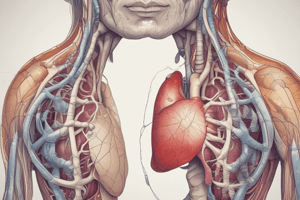Podcast
Questions and Answers
What is the term for the total amount of air that your lungs are able to hold?
What is the term for the total amount of air that your lungs are able to hold?
- Tidal Volume
- Total Lung Capacity (correct)
- Residual Volume
- Ventilation
What is the function of the respiratory system in terms of gas exchange?
What is the function of the respiratory system in terms of gas exchange?
- To transport oxygen to the body
- To facilitate ventilation
- To allow for diffusion to occur (correct)
- To protect against inhaled particles
What happens to the diaphragm during inspiration?
What happens to the diaphragm during inspiration?
- It relaxes
- It expands
- It contracts (correct)
- It stays the same
What is the term for the amount of air left in the lungs after a maximal exhalation?
What is the term for the amount of air left in the lungs after a maximal exhalation?
What is the term for the breathing rate, measured in breaths per minute?
What is the term for the breathing rate, measured in breaths per minute?
What is the term for the flow of a gas from a place of high concentration to a place of low concentration?
What is the term for the flow of a gas from a place of high concentration to a place of low concentration?
What happens to the intercostal muscles during inspiration?
What happens to the intercostal muscles during inspiration?
What is the formula to calculate ventilation?
What is the formula to calculate ventilation?
Flashcards are hidden until you start studying
Study Notes
Respiratory System
- Total Lung Capacity (TLC): The total amount of air the lungs can hold, measured in liters.
Breathing Process
- Tidal Volume (TV): The amount of air inspired or expired per breath.
- Respiration Rate (RR): The number of breaths in and out per minute.
- Ventilation: Calculated by multiplying Tidal Volume (TV) and Respiration Rate (RR).
Lung Function
- Residual Volume: The amount of air left in the lungs after a maximal exhalation.
- Functions: Protects against inhaled particles, allows for diffusion to occur.
Inspiration and Expiration
Inspiration
- Diaphragm contracts.
- Intercostal Muscles contract.
- Lungs expand.
Expiration
- Diaphragm relaxes.
- Intercostal Muscles relax.
- Lungs contract.
Diffusion
- The flow of a gas from a place of high concentration to a place of low concentration.
Studying That Suits You
Use AI to generate personalized quizzes and flashcards to suit your learning preferences.




